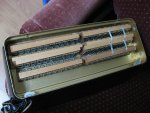James
Active member
When I tried to take out the blocks, I found them stuck to the base. Yes, I did take off the two screws at both ends. I shook them and they were stubborn. I guess they could be stubborn because of having stood there for so many years having never been lifted. But I still did not dare to use force. Any idea to share? Thank you!


